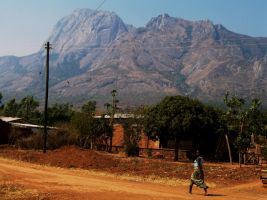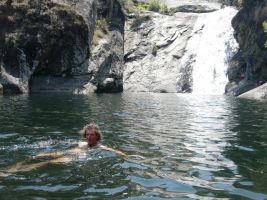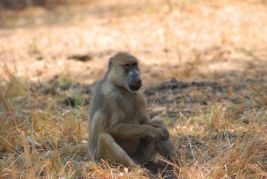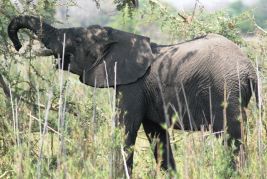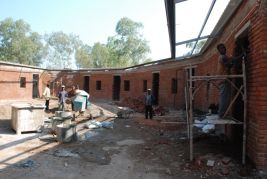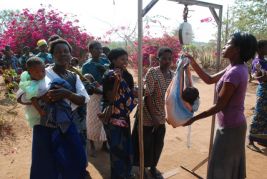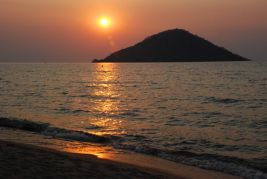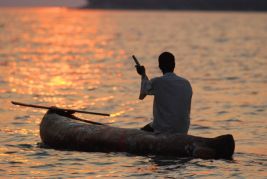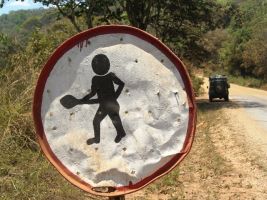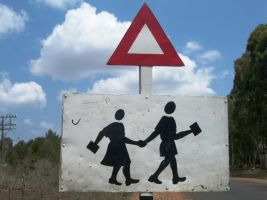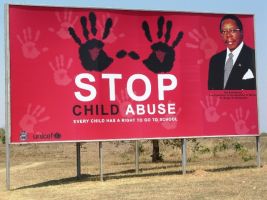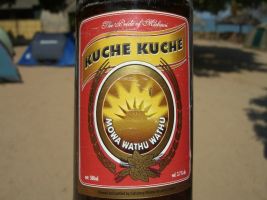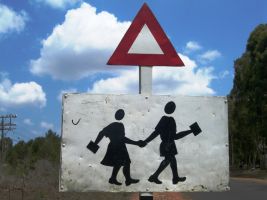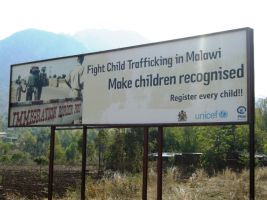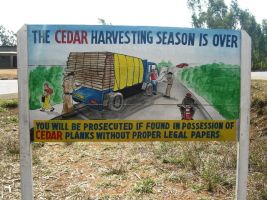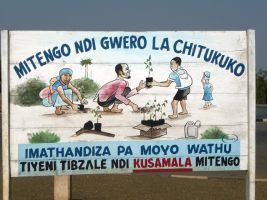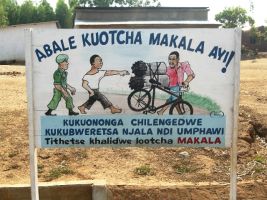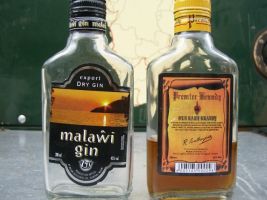
 Italia
Italia France
France Spain
Spain Morocco
Morocco Mauritania
Mauritania Senegal
Senegal Mali
Mali Burkina
Burkina Ghana
Ghana Togo
Togo Benin
Benin Nigeria
Nigeria Cameroon
Cameroon Gabon
Gabon Sao Tomè
Sao Tomè Gabon 2
Gabon 2 Congo
Congo Congo DCR
Congo DCR Angola
Angola Namibia
Namibia Sud Africa
Sud Africa Namibia 2
Namibia 2 Botswana
Botswana Zimbabwe
Zimbabwe Botswana 2
Botswana 2 Sud africa 2
Sud africa 2 Swaziland
Swaziland Mozambico
Mozambico Malawi
Malawi Tanzania
Tanzania Rwanda
Rwanda Uganda
Uganda Kenya
Kenya Etiopia
Etiopia Sudan
Sudan Egitto
Egitto Libia
Libia Tunisia
Tunisia Malta
Malta
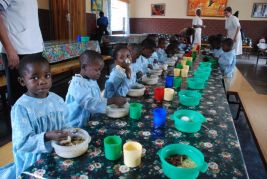
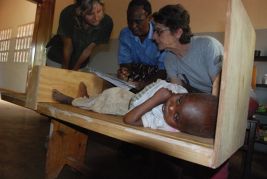
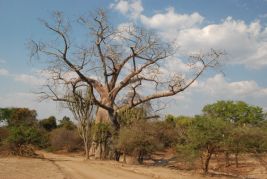
Milange Entrance to Malawi – 20 Sep 2008
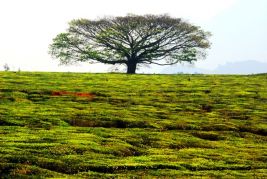
Within a few minutes, we pass through the border.
We exit Mozambique.
We enter Malawi.
Passports and the Carnet de Passage are stamped.
There are notices that say car insurance is obligatory but there aren’t any companies here on the border, so we decide to reach the first city and just see what happens.
After the poverty and the arid lands of Mozambique, these well-cultivated tea plantations give you the impression of being in Switzerland.
Mount Mulanje 3001m – 20 Sep 2008
We go for a walk in the park of the great mountain.
We really have no desire to face the 2700-metre climb and spend two days with a must-have guide to the summit, with an overnight stay in their huts. We allow ourselves a three-hour stroll on our own up to the waterfalls whereupon, finding the water rather warm, we can’t resist having a very invigorating swim.
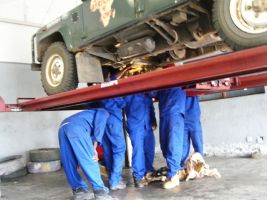
Blantyre and the recycled paper - 21 Sep 2008
This small country town takes its name from the Scottish town where David Livingstone was born; however, there is nothing particular to see. We change currency and have a repair job on our K7 in a specialized Land Rover garage.
They have to change an oil seal on the transfer box. It usually takes a mechanic an hour to do this job. Here they take a bit longer…
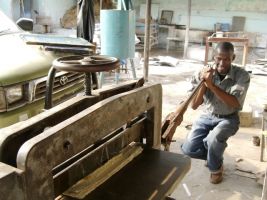
In the city, there is an artisan laboratory where recycled paper and other African materials are produced.
Along with the recycled paper, they use banana leaves, baobab sticks and elephant dung.
The objects are very beautiful and we like the initiative.
We sustain the project and we buy some items for the Elfo Solidarity stalls (details in solidarity).
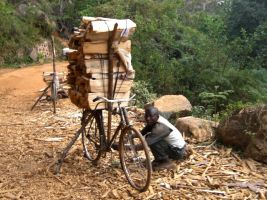
Reckless deforestation
They are foolishly cutting down trees.
They are deforesting Malawi.
Very soon, there will be nothing left, the humidity will drop and desertification will kick in. Especially the Chinese, they are eating up Africa.
The local politicians have allowed this; nobody seems to care about them.
Moreover, when the aridity and famine caused by the parched ground arrives, what will they do then? Go back to old the European colonizers or the Chinese?
In the meantime, the local people get a small benefit. With their bikes, they travel 10km going upwards of 700metres. They cut and break the wood from dispensable tree trunks. With masterly skill, they get it onto their bikes - their means of transport - and then slowly and laboriously but with surprising skill they go back down the same route they came.
Liwonde National Park - 24 sett 2008
A very nice park. It is even appealing to those that, like us, have just seen the huge parks in Botswana and South Africa.
There aren't any felines but there are hippos, elephants, crocodiles, kudus, sable antelopes, warthogs, waterbucks, bushbuck, impalas and yellow baboons that we had never seen before.
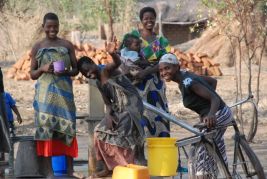
We leave the park through an unusual gate on the desert side. At this gate, there are no guards, we open and close it ourselves.
Maybe, having not signed our departure, they are still looking for us…
We are trying to reach a village out in the woods, where there is an Italian on a mission.
The track outside the park is nothing more than a pathway.
We come across people the countryside that have never seen tourists; they are so genuine and marvellously and friendly.
Eugenio’s villages
It is incredible how far hard work and determination can take you. For a few decades here in Malawi, Father Eugenio changed the life and face of this remote village in the countryside. He has built and started a nursery, a primary school, a secondary school and a college. Also, there is a dispensary, a maternity centre and a small emergency hospital that last year saved 43 people sick with cholera; there are cholera epidemics every other year here.
There is a community of 900 people with HIV organized into various groups, living together, helping and assisting each other. This prevents the isolation that often this disease brings. There is a nutritional centre that hands out high-protein food once a week. He has also built twenty wells and ten other schools in the surrounding villages.
A facility to aid those affected by the Aids virus is currently under construction to help those convalescing. There is also a nice centre with laboratories for the study of AIDS. There is a future irrigation project planned and we lend a helping hand with an Elfo token (details in solidarity).
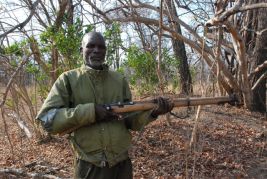
Just to remind ourselves where we are!
We’re in Africa!
Where all that us westerners posses is in demand, sought-after and craved for.
These same possessions, displayed in Africa are considered altogether contrastive.
During these eleven-months, we have travelled without any incidents of aggression – not counting that punch given to the side of the car by a drunk whilst we were crossing a market in Ghana, the scar of which will remain a glorious memory on K7.
Our experiences so far, without aggression or incidents of robbery, could lead one into complacency and the letting down of one’s guard.
Big mistake!
Episode 1:
Last week, six young backpackers, heading towards a camping area where we were staying in Blantyre, where attacked and stabbed by some locals trying to rob them. It was seven in the evening. We saw a devastated couple arriving with blood-drenched clothes from the blood of their friends they had taken to hospital; Malawi is considered one of the safest countries of this zone.
Episode 2:
Two days ago in the park, at the camping area, in the dead of night, four shotgun shots where fired just metres from K7. We believed that it was for animals that had got too close, but later they told us that they don’t shoot at animals. It was in fact, the guards firing at two thieves that had slipped into the reserve under the vale of night, with the intention of robbery. How could they have seen them? No one got up anymore to go to the toilet.
Episode 2:
We meet a lonely French guy with his Land Rover. His companion returned to France after a night of aggression they had endured in Botswana. It happened in Maun, where we have slept as well, within a camping area that was also guarded. Five men with baseball bats and knives destroyed the igloo-shaped tent, broke the car windows and took everything that was in the car, including documents; the guards had chosen to disperse. The police simply told them how commonplace these incidents are and showed them the pile of complaints and protests on the desk. No one talks about it. The French guy tells us, that he is still unable sleep at night.
All this reminds us of the importance of vigilance. Keep on your guard, lock-up everything all of the time and never trust.
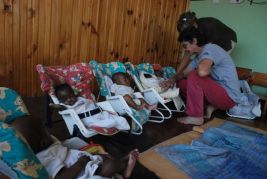
Rita’s orphanage – 25 Sep 2008
Rita Milesi, a laic missionary for over 30 years in Malawi, has set-up, organized, and now runs this orphanage for babies. This clean, spotless, colourful and happy building is home to twenty-four orphans up to 3-years of age. A further seven-hundred older children from afar have been adopted and helped. There is a mill that the locals use to grind corn and grain, a nutritional centre offering assistance, food and nutritious supplements that are handed out weekly. There is also an education programme dealing with hygiene and sanitary issues for mums with and without HIV. Many local people work in these projects but overall, Rita runs it by herself.
If anybody is willing and would wish to have the great experience to help her out her for a week or two, she would be more than happy to have you. You could lend a helping hand and discover a side of life in Africa that is normally unseen by tourists.
For an important new project, we leave Rita an ELFO token (details in solidarity)
Maclear Cape – 26 Set 2008
Clear just like the water of this lake, Lake Malawi or Niassa is the third largest in Africa.
It really looks like the sea. The large numbers of the coloured tropical fish we see in aquariums come from here.
Scuba diving here should be wonderful, but sadly these waters are infested with bilharzias; a chronic disease caused by larvae that penetrate the skin, an experience we’d rather give a miss.
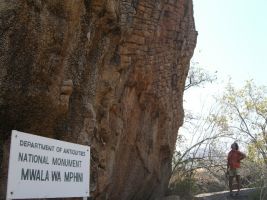
MWALA, national monument – 27 Sep 2008
This rock is the national monument, over time, erosion has left its mark.
Ah well…
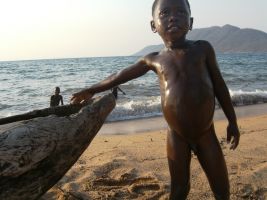
Senga Bay – 28 Sep 2008
Another stop on the lake before we reach the capital city.
We decide not to take the route through Zambia, because it is too expensive and the police are known to be exasperating. They don’t recognize the Carnet de Passage, the visa is very expensive and its animal park can’t offer us, even though is probably very nice, anything more than what we have seen a lot of already with probably more to follow.
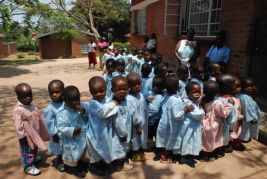
Stop-over at St. Mary’s Rehabilitation Centre. 29 Sep 2008
In Mvera we were looking for a missionary from Carpi (Modena). Unfortunately, he returned to Italy in January. Nevertheless, we find another centre for orphans; Spanish and Indian nuns run it.
No matter, solidarity has no boundaries. There are one-hundred and thirty-five children from nursery to secondary school age all organized through the same centre. A further six-hundred children from outside are taken into care by voluntary families where they’re helped and supported in school education. Everyday, four teachers do their rounds on bikes to the different villages, to check up on the progress and the attendance of children in school. Every Saturday, three-hundred and fifty children go to the centre for extra lessons and to get some high-protein flour. There are seventy permanent paid workers. There’s also a dispensary, and a surgery that is open daily with rooms and beds for emergencies. We leave an ELFO token (details in solidarity).
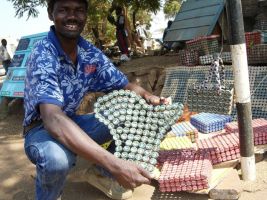
Lilongwe the Capital – 1 Oct 2008
There’s nothing special to see or to do in this city. Some shopping, some time at an internet point and a courtesy call to the Italian Consulate - Eugenio, a businessman, is here with his Italian family, he has been working here for 25-years.
We meet Wensley, who says he can produce baskets, carpets, saucepan mats, boxes for jewels and picture frames. All with metal wire and bottle tops.
We order a custom-made “Africa” that we collect the following day.
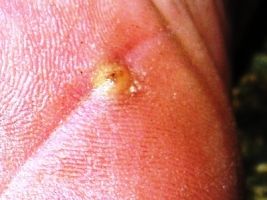
Skin-piercing Bugs
Have you ever seen a skin-piercing bug?
This delightful creature burrows its way under the skin, under your feet, whereupon it lays its eggs; the yellow colouration you see in the picture isn’t puss but the actual eggs.
It isn’t African, it comes from Brazil. The ancestors of this one that I’ve been carrying around for the last few days, probably arrived here towards the end of the 19th century on a Portuguese galleon, buried in the heel of an unsuspecting seaman.
Slaves were exported and these bugs were imported!
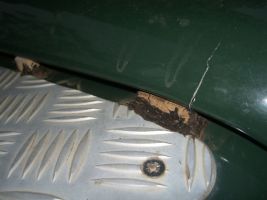
Cracked Bonnet
Continuing problems with the bonnet; it seems to be finding it hard to cope with the vibrations and the weight of the spare wheel. A noticeable crack is growing relentlessly. A remedy, which I hope works, of wine corks and silicone.
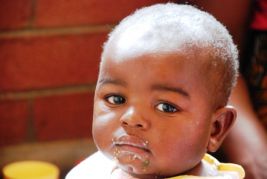
Chintheche – 2 Oct 2008
This place looks like heaven on earth. Along the warm calm lake, a beautiful clean white sandy beach; a flat meadow shaded with mango and bamboo trees. Clean services, water, satellite TV and a good restaurant that serves very fresh fish in a candlelight atmosphere.
It’s a pity that it is plagued with millions of small flies, like the ones found around grape vines. They incessantly enter your mouth, ears, eyes and in anyplace left open with a suicidal frenzy. They call them lake-flies and as there are so many of them, the locals eat them! They capture them in a basket, boil them and then turn them into meatballs; a treat also for smaller children.
The following day, we escape, following our decent into hysteria.
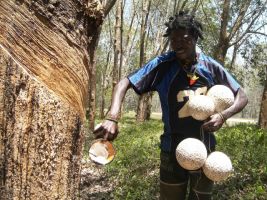
Rubber Forest – 3 Oct 2008
The rubber trees are a resource in this part of the country. For James it is even more so if he can sell a bouncing ball made with latex wire to the passing tourists.
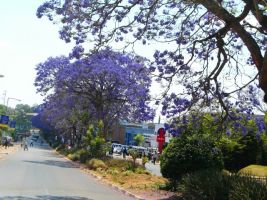
Mzuzu – 3 Oct 2008
Last town in the North of Malawi. Good for a fill-up of fuel, and to get some bread, oh, and an accident in the car.
Well, not so much as an accident, just a minor bump reversing out of a parking space. I only bent his side mirror; the car was already falling apart of its own accord (only held together with a residue of red paint). However, to avoid problems, the gathering of a crowd, the police getting involved, having possible kickbacks and surely an afternoon of paper filling, I fill the guy’s mouth with Kwacha and within ten minutes the problem is resolved. Total expenditure 39-Euro/pounds - money well spent.
Anyway, in October this country has lovely avenues; Jacaranda, all bursting with purple flowers along with wonderfully flowering lilies.
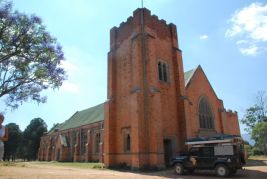
Livingstonia – 4 Oct 2008
Very steep, menacing and a hard rocky surface. During the rainy seasons this 15km road is unusable, and in this dry season, it is quite unbearable. First and second gears, really slow and arduous with corners that bank up. Once you have reached the city dedicated to Dr. David Livingstone - who never even set foot here - the view looks out towards the lake. The summit at 900metres, despite the sun is airy and fresh. Apart from the view, there is nothing particular to see. The church, student homes, the hospital, school and university, all built by Protestant missionaries that arrived in 1894.
There’s also a “rock house” that has a museum, that quite frankly was bare and dissapointing.
For its inhabitants, a great healthly opportunity to grow in the future.
For tourists visiting, this is a place for the atmosphere, in the style of Timbuktu.
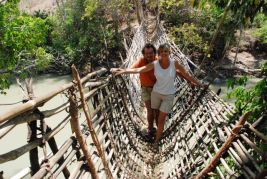
Suspension Bridge
Here’s an African thriller!
A suspension bridge made of canes and wood, built in 1904!
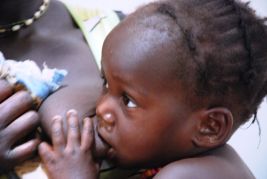
Our Impressions
The main roads are generally in quite a good state and well surfaced, with the tracks also in good condition.
There are often roadblocks. The police were very good with us and they rarely asked us for our documents. The people are relaxed and a little exuberant in character, tourists are left alone. They are people that have never been involved in violent offensives or civil war.
Malawi is economical, everything is relatively cheap; food, restaurants, souvenirs, camping. Only petrol and fuel are extremely expensive, almost European prices.
There are many schools, orphanages, hospitals and centres that help the people, all built by missionaries from all different types of churches, from Muslim to Catholic.
The state gives a small helping hand towards the workforce.
A strong presence of ONG, of all kinds. AIDS is at a high level, 50% of the sick are HIV positive.
There is plenty of Agriculture and farming.
Many bikes! Often used for carrying goods, sometimes as taxis.
